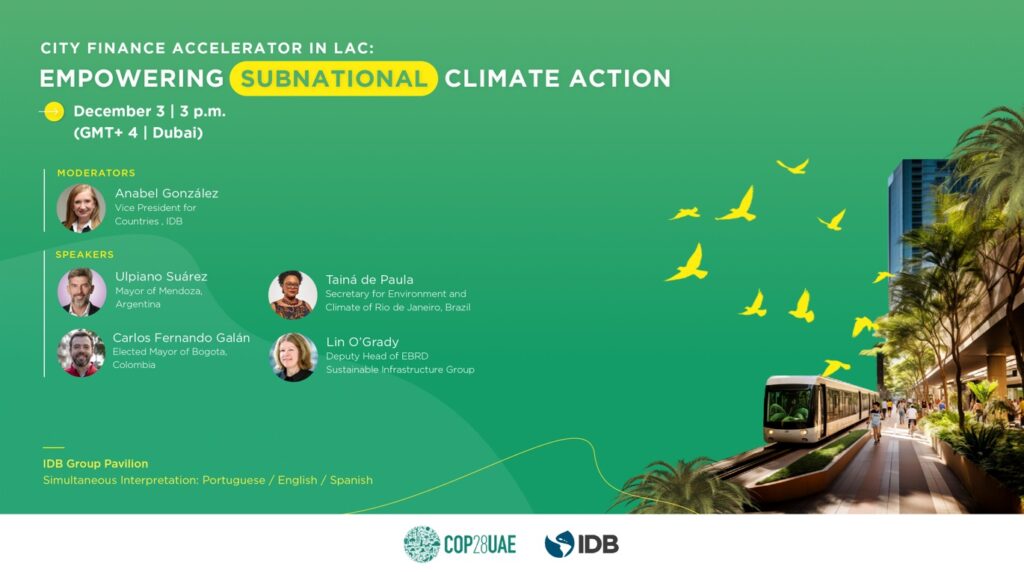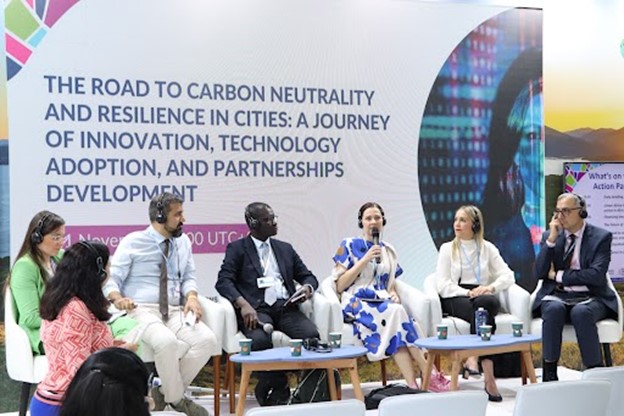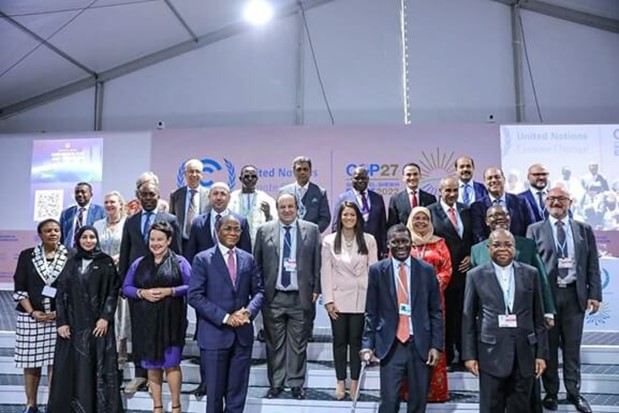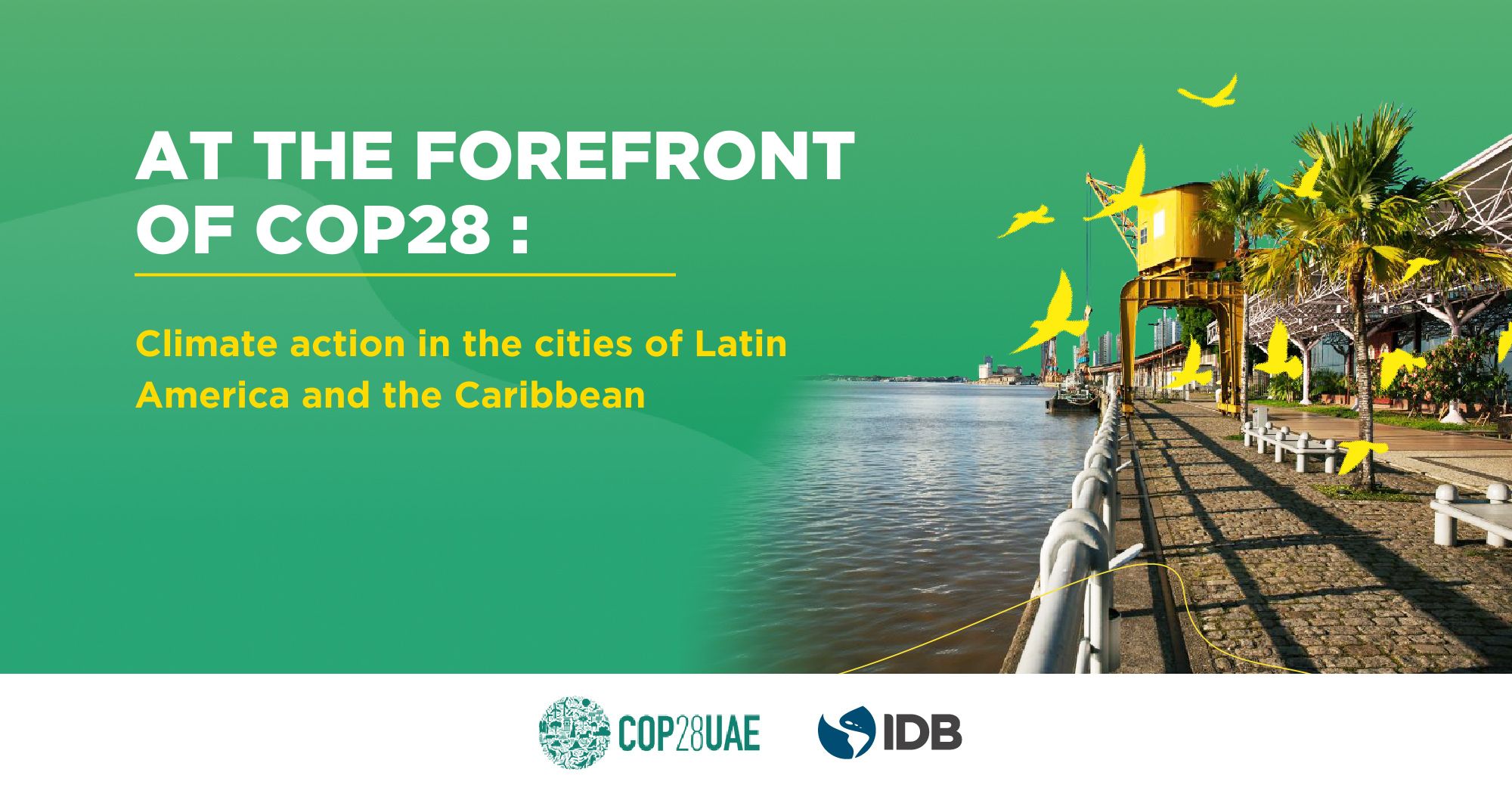Este artículo está también disponible en / This post is also available in: Spanish
Cities play a leading role in climate action. In a recent article, we explained how municipalities in Latin America and the Caribbean (LAC) can contribute to achieving the goals set in the Country Agreement and the Nationally Determined Contributions (NDCs) of their countries. Cities are responsible for around 70% of the region’s greenhouse gas emissions and bear almost 80% of the losses from disasters. With COP28 taking place in Dubai, cities in the region are not only preparing to face their own climate challenges but also positioning themselves as leaders in global climate discussions.
Today, we begin a blog series framed within the IDB’s participation in COP28, where we aim to highlight the most relevant issues for cities in their fight against climate change. This series, titled “At the forefront of COP28: Climate action in the cities of Latin America and the Caribbean,” explores how municipalities in LAC are innovating and collaborating to build a more sustainable and resilient future, emphasizing the commitments made by countries in the Paris Agreement. By illustrating the progress already made and the plans for the future, this series of articles aims to inspire more cities to take the lead in climate action and calls for action for COP28 and the short term.
In this first article of the series, we explain the role of subnational governments in global climate discussions, highlighting the growing involvement of cities in these summits. We emphasize the world’s opportunity to harness the potential of cities to scale up and accelerate climate action. Don’t miss it!
COP28: What does it mean for cities and the role of subnational governments?
First of all, let’s get some context: What is COP28? It is the 28th Conference of the Parties to the United Nations Framework Convention on Climate Change (UNFCCC), and this year it is taking place from November 30 to December 12 in Dubai, United Arab Emirates (UAE). These annual conferences bring together the signatory countries of the Convention to assess progress in the fight against climate change, establish agreements and commitments to reduce greenhouse gas emissions, and adapt to the impacts of climate change.
Subnational governments in our region, such as cities, regions, and provinces, play a significant role in COPs. Although they are not formal parties to the Convention, these governments can influence the global climate change agenda in various ways. Here are some of them:
1. Active participation in side events, forums, and panels
During COP28, cities in LAC have the opportunity to showcase to the world their vulnerability and commitment to climate action. From integrated active mobility in Mexico City and tax refunds for green construction in Salvador to the use of rain gardens in Quito and environmental education in Rio de Janeiro, cities in the region have driven a wide range of initiatives for climate action, creating valuable benefits for communities, economies, and health.
2. Advocacy and lobbying
Mayors from around the world, along with other representatives of local governments, have been attending COPs to advocate for more ambitious climate policies and for national governments to increase their commitments and actions, addressing the specific needs of cities and territories they represent.
3. Influence in negotiations
Although they do not have a formal role in the UNFCCC negotiations, subnational governments can indirectly influence through their respective national governments and by participating in side events and discussion forums during COPs.
4. Implementation of commitments
Subnational governments are crucial in implementing the commitments made by countries in their Nationally Determined Contributions (NDCs) to the Paris Agreement, especially in areas such as urban transport, waste management, construction of sustainable buildings and infrastructure, and land use planning. Many countries in LAC have prioritized the cities, infrastructure, and/or human settlements sector in their NDCs, with energy, transport, and waste being the most mentioned sectors in urban mitigation challenges and responses. Infrastructure and water are the most mentioned sectors in urban adaptation challenges and responses.
In summary, subnational governments are essential actors in the global effort to address climate change, providing leadership, innovation, and action at the closest level to citizens.
The voice of cities in climate summits
While the voice of subnational governments has gained prominence in recent years, they have been involved in global climate discussions since the beginning.
During the Earth Summit in 1992, the “Local Governments and Municipal Authorities (LGMA) constituency” was created. Since the first climate COP in 1995, the LGMA has been the official channel for cities and regions to engage with the UNFCCC, growing to include more than 45 accredited networks of local and regional governments. Through the LGMA, contributions to global climate negotiations are coordinated throughout the year, influencing and reporting results towards the fulfillment of the Paris Agreement through periodic communications and monthly webinars with thematic and regional working groups.
Among the most relevant messages that cities around the world have been advancing in climate negotiations are:
- Recognizing the leadership of subnational governments in accelerating and expanding climate action.
- Increasing their participation in NDCs, National Adaptation Plans, and long-term strategies.
- Providing financial and technical support for the implementation of locally-led climate actions and establishing financial mechanisms to access climate funding opportunities quickly and directly for subnational governments.
- Calling on UNFCCC parties to adopt an Action Plan on Cities and Other Subnational Governments for Climate Mitigation and Adaptation.
In addition to the LGMA and its position papers, the Egyptian presidency of COP27 convened the first Ministerial Meeting on Urbanization and Climate Change in a UNFCCC COP in 2022, focusing on housing, urban development, and multilevel action related to climate change. The meeting reinforced the commitment of the Paris Agreement to multilevel climate action and accelerated mitigation of climate change, adaptation to climate change, and local climate financing. Additionally, the event launched the Sustainable Urban Resilience for the Next Generation (SURGe) Initiative, dedicated to equipping cities to accelerate local climate action and connect local, national, and global levels with the vision of achieving global climate goals.
Towards COP28 and beyond
To effectively address climate change and meet the commitments of the Paris Agreement, cities in LAC have a crucial role. COP28 serves as a platform for cities in LAC and around the world to showcase their leadership and collaborate in scaling up climate actions. Notably, there is a Multilevel Action and Urbanization Pavilion hosting in-person and hybrid events on the role of cities as climate action leaders; the second Ministerial Meeting on Urbanization and Climate Change will take place, and the Local Climate Action Summit (LCAS) has been held for the first time, bringing together subnational and national leaders to establish a new paradigm of integrated climate action among governments at all levels.
In the same vein, the IDB’s Housing and Urban Development Division has organized several events during COP28. These gatherings aim to give prominence to subnational governments and highlight the specific needs, challenges, and opportunities of cities in LAC. Here are our events:
1. Amazonian Cities Forum
This event brought together mayors from the recently created Amazonian Cities Forum. The session served as a platform to showcase the strategic role of Amazonian cities for sustainable development and raise awareness of the importance of the Amazonian Cities Forum as a space to convene, advocate, and prioritize the urban agenda in the Amazon region. Enjoy the recording of the event here:
2. Urban Financing Accelerator in LAC:
Empowering Subnational Climate Action Panel dedicated to emphasizing the critical importance of facilitating cities’ access to credit at more competitive interest rates and disseminating existing local financing sources, including government budgets and investments. It also explored the conducive environment and innovative mechanisms needed to finance sustainable urban development.

3. Enhancing Urban Resilience in Cities through Nature-Based Solutions
Focused on leveraging green infrastructure, nature-based solutions, and resilient and low-carbon housing, the event addressed how such interventions can offer multifaceted benefits in terms of quality public spaces and urban resilience aimed at improving public spaces and urban resilience in vulnerable urban areas of LAC.

The voice of cities matters!
To conclude this first blog of the “At the forefront of COP28: Climate action in the cities of Latin America and the Caribbean” series, we leave you with an invitation: during COP28 and beyond, we have the opportunity to drive global climate action through meaningful participation of cities and regions worldwide and give cities the recognition they deserve as crucial actors in the fight against global warming. The voice of cities matters!


Image: LGMA Multilevel Action Pavilion at COP27: Home of cities and regions at COP27 | Sharm-El-Sheikh | Nov 6-18, 2022
Image: First Ministerial Meeting on Urbanization and Climate Change at a UNFCCC COP during COP27 in Egypt (2022)


Leave a Reply